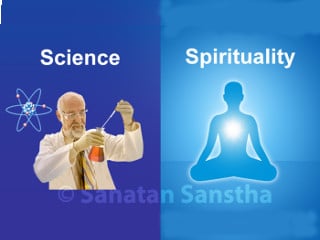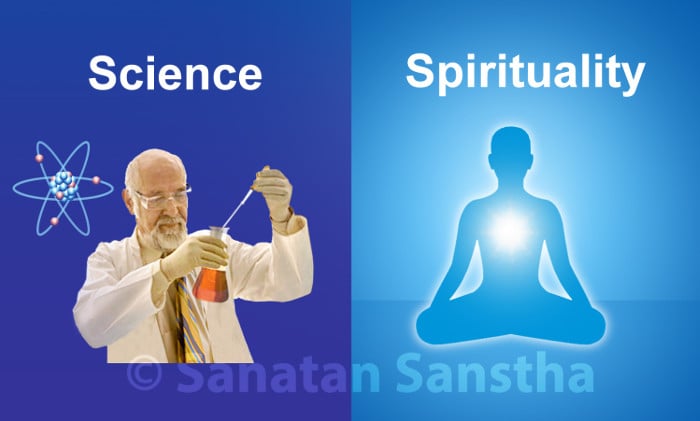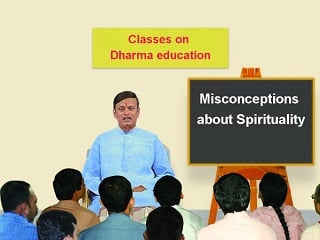Through physical sciences, only the gross can be understood. That which is beyond the five sense organs, mind and intellect is the subtle. Ability to understand the subtle is developed through Spiritual practice. Physical science is only able to impart us object related happiness, however Spirituality is capable of imparting supreme Ānand (Bliss) and Omniscience. Spirituality is not a subject to be understood at an intellectual level; instead, we need to practically follow it and obtain spiritual experiences.
1. Limitations from Happiness-Unhappiness point of view
A. Science cannot save us from unhappiness every time
There are several examples in our daily life, such as, the television set, refrigerator, air-conditioner, internet etc. by which man becomes happy. Science can provide a lot of pleasure to man, but cannot save him from unhappiness every time; for example, when the television set, refrigerator etc. break down, man becomes unhappy.
B. Science cannot help overcome unhappiness caused by spiritual causes
Many problems occur due to severity of spiritual causes, such as, a person being a regular patient or not getting cured despite a lot of medical treatment, a good-looking graduate girl not getting married despite intensive efforts, a person not being able to bear a child, or if he bears one, the child is handicapped etc. There is a spiritual reason for 80 percent of unhappiness in man’s life in less or more proportion. Science cannot eliminate the spiritual causes. Therefore, naturally it also cannot eliminate the unhappiness created by such causes. There is only one way to overcome the spiritual causes of unhappiness and that is by performing sādhanā (Spiritual practice).
Explanation about the spiritual reasons of unhappiness is given in Article ‘Happiness and Unhappiness’
C. New inventions of science providing happiness are suicidal
Due to new inventions, has man really gained happiness ? New inventions of science may give physical happiness to man; but since true happiness depends on the state of mind, no matter how many inventions take place, man will never become happy.
We give importance to the body; we should not give more importance than necessary. If the medium of Spirituality is also dependent on the body, how is it that we cannot give importance to the body? But to think that the body is everything and get carried away in keeping it happy and thus discomforting the soul is suicidal. Thus, the present flow of reforms is suicidal in nature.
D. Increase in man’s unhappiness and downfall of moral values due to science
No matter how much progress modern science makes, since it has increased man’s sense of gratification, he is gradually becoming Tama–predominant. Since western countries have become Tama-predominant, immorality is rampant in their society. Today, as leaders of those nations are unable to get any solution to eradicate immorality in the society, they have become restless.
2. Science is incomplete, untrue and transient, whereas Spirituality is complete, true and eternal
A. The ‘Truth’ in science constantly undergoes changes
The following happens with respect to science. A scientist makes some research and draws some inference from it. The world praises his inference. After some time, another scientist does research on the same subject and improvises the research made by earlier scientists or proves the earlier scientists wrong and establishes his own opinion. This means the ‘Truth’ propounded by the earlier scientist through research becomes ‘untruth’ over a period of time.
For example, earlier it was believed that the earth was flat. Then it was discovered that the earth is round. After some years, scientists found that the earth is not round, but geoid. Thus, there are constant additions in scientific knowledge. The ‘Truth’ in science constantly changes. Hence, revised editions of science subjects are published. From this, it is clear that science is untrue and incomplete. Thomson, a well-known scientist, has said, ‘Incomplete science has nothing to do with the final Truth. Science should understand its own limitations’.
B. The ‘Truth’ in Spirituality never undergoes change
-
Karmakānḍ’ (Spiritual practice of rites, rituals and observances performed at the physical level) continues to be performed in the same manner for thousands of years and the same benefits are obtained from it : Scientific experiments should be performed as prescribed in the related science; then alone expected inference and benefits are obtained. Similarly, if an expected benefit is required from a specific ritual as described in the scriptures, the ritual should be performed as described only. The ritual, that is, the method of performing the experiment is called ‘karmakānḍ’ in the language of Spirituality. The uniqueness of karmakānḍ is that it has been performed in the same manner for thousands of years and the same benefits are derived from it. Hence, millions of people are performing karmakānḍ even today.
-
The teaching on Dharma provided by Saints never undergoes a change. Saints have true knowledge of Dharma. Their teaching is by itself Dharma. His Holiness Bhaktarāj Mahārāj wrote several devotional songs as per the blessings of His Guru on various topics such as Bhaktīyoga (Path of Devotion), Dnyānayoga (Path of Knowledge) His Holiness Bhaktarāj Mahārāj used to say about these devotional songs, “Try to change a word here or there, it will not be possible”. Since Saints have become one with God, their words are the words of God Himself. Hence, the teaching on Dharma provided by Saints never undergoes a change.
-
Spiritual Holy books like the Vēdās, Upanishads have reprints but not revised editions.
-
What is eternal and beyond the realm of time is the only Truth. There is only one Truth in the universe, and it is the Supreme God. One should be determined to know that Truth.
-
A person will not become happy if he searches only ‘within’ and not his ‘inner self’. Searching the inner self is the basic foundation. If one builds a building of searching ‘within’ without this basic foundation, there is no guarantee when it will fall’.
3. What a person understands immediately through sādhanā, takes several years, enormous funds and huge manpower for science to understand
Today science claims, “After visiting Mars we will have crossed a great milestone in the annals of science and will know if there is existence of life there”. Dr. P.V. Vartak from Pune went to Mars through meditation. The observations he made on Mars corresponded with the observations of NASA (National Aeronautics and Space Administration – America’s space agency) quite a bit. In Spirituality, visiting Mars with the subtle body and returning to earth is like a child’s play, or at best it can be termed as the mind has been ‘purified’. Hence, physical sciences are the first step in the learning process, while Spirituality is the final one.
4. Through science, only gross knowledge is obtained; whereas, through Spirituality (Meaning, sādhanā here) along with the gross, we obtain knowledge of the subtle.
-
The knowledge of the subtle (which is beyond the intellect) is superior to that of the gross (which is understood by the intellect) : Gross means that which can be understood by the five sense organs, mind and intellect. Through physical sciences, only the gross can be understood. That which is beyond the five sense organs, mind and intellect is the subtle. Ability to understand the subtle is developed through sādhanā.
-
Use of subtle-knowledge for legal purposes: Before China took over Tibet, Tibet had judges in courts who had knowledge of the subtle. Even today, developed countries like USA are seeking the help of those who have knowledge of the subtle for catching criminals.
5. Physical sciences are unreliable
-
A few decades ago, physical sciences invented plastic. After realising that plastic causes large scale pollution, use of plastic was banned to some extent to control pollution.
-
Physical sciences invented fuels like petrol and diesel a few decades ago. After realising that they cause large scale air pollution, various solutions are being implemented to control their use. In short, science cannot give a guarantee about anything. On the contrary, science of Spirituality is a complete and reliable science.
6. Harmful effects of science on man’s life
-
Side effects of medicines invented by science on the patient : During the last two decades, many medicines were withdrawn from the market because it was revealed that they were either useless or harmful.
On the contrary, Āyurvēdic medicines do not have any side effects on a patient. Āyurvēda is considered as the fifth Vēda. Now, the westerners have also realised the importance of Āyurvēda. They are conducting research on it and trying to patent Āyurvēdic medicines.
-
Water pollution due to Plaster of Paris (POP) and its fatal effect on the health of living beings : On Gaṇēsh Chaturthī (Birth of Shrī Gaṇēsh according to the Hindu lunar almanac on Bhādrapad Shukla Chaturthī, that is, the fourth day of the bright fortnight of Bhādrapad), Gaṇēsh Idols are worshipped everywhere. In the earlier times, Idols were made of clay only. When science invented POP, people started making Idols from POP. After immersion of Idols made from POP, water gets polluted and it has a lethal effect on the health of living beings.
Spirituality does not have such harmful effects on mankind. On the contrary, man benefits. According to religious scriptures, Gaṇēsh Idols to be worshipped on Gaṇēsh Chaturthī should be made of clay. Clay does not pollute the water.
Dr. E Hanbury Hankin’s research of the nineteenth century relates to the disinfecting/antiviral power of the Ganga’s water. Hankin (1896) reported that, cholera microbes did not survive for long in the Ganga’s waters. He noticed that the microbes died soon (in less than three hours) in the beaker containing the Ganga water, whereas no great change took place in the living concentration of cholera microbes even after 48 hours in the beaker containing distilled water.
7. There is no guarantee that scientific knowledge will not be misused, but there is a guarantee that spiritual knowledge will not be misused
-
Production of atomic weapons that are destructive for humans upon misuse of atomic energy and their use: When science invented atomic energy, it was welcomed worldwide. It was hoped that by constructive use of atomic energy the entire human race will progress and the whole world will be happy. Unfortunately, atomic energy was misused later and atomic weapons which proved destructive for human life were produced. Today, atomic technology has advanced so much that if misused, human race on earth will be destroyed within a few moments.
-
Sages, Seers and Saints not only have the energy to destroy but they also possess the energy to protect : Since today people other than Saints have acquired power and since they are Tama-predominant, there is destructive energy in their weapons; but they do not possess energy to protect. In ancient times, revered people had weapons with great destructive energy like the Brahmāstra, which would have reduced the earth to ashes in a moment. Holy texts such as Rāmāyaṇ, Mahābhārat etc. testify that such energies were used. Indra, the King of Gods, too was desirous of them and He had to become disciple of Sage Machhindranāth to obtain its Vātākarshaṇ-shaktī (Energy of attraction). Despite the destructive energy with revered people, since they were sāttvik, they also possessed the energy to protect. For example, if the environment became polluted upon use of a certain weapon, they would immediately purify the environment by using another weapon.
-
Since the knowledge of Spirituality is received only by the deserving, it is not misused : In the earlier times, Sages and Seers would give a seeker knowledge, mantra or Gurumantra only after the Guru or the Deities were pleased with him or after testing and ensuring that the seeker deserved knowledge, and would tell him to keep it a secret. This secrecy was observed after taking into account that the knowledge or mantra is an extraordinary energy and it can be misused. Again, their Ichhā-shaktī (Energy of will) was so powerful that if a disciple turned out to be dishonest, they would curse – ‘Your knowledge will be futile from this very moment’. Hence, even if the disciple had knowledge of some mantra, he was not able to use it. Shrī Parashurām’s cursing of Karṇa is a classic example of this.
Only people with faith and sāttviktā use spiritual knowledge and mantras for their spiritual progress and for the welfare of the world. The aim of retaining Divine spiritual power only for them has proved to be successful and will be successful in future too.
8. The immortality of the Nation is decided by the establishment of Dharma, not by scientific progress
Dharma which nurtures man is the soul of a Nation. Hence, a Nation which has no place for Dharma becomes soulless. Such a Nation disappears in course of time. Conversely, a Nation based on Dharma lasts for a long time.
9. Science is unable to provide spiritual experiences
If devices to record subtle events are invented, then at the most they will be useful for documentation and not for bestowing the actual experience; whereas, it is important to actually experience them. If scientists discover the Neelbindu (A blue dot experienced by evolved seekers at the zenith of meditation) with the aid of scientific devices, they will accept its existence, contemplate on it for several years, hold discussions and write thesis on it. However, it is more important to meditate and become introverted so as to actually experience the Neelbindu than to do all this.
Reference: Sanatan Sanstha’s Holy Text on ‘Introduction to Spirituality‘ and ‘Spirituality‘



 Obstacles faced when studying Spirituality
Obstacles faced when studying Spirituality Importance of Spirituality
Importance of Spirituality Misconceptions about Spiritual practice ( Sadhana )
Misconceptions about Spiritual practice ( Sadhana ) Qualities essential for Spiritual practice ( Sadhana )
Qualities essential for Spiritual practice ( Sadhana )